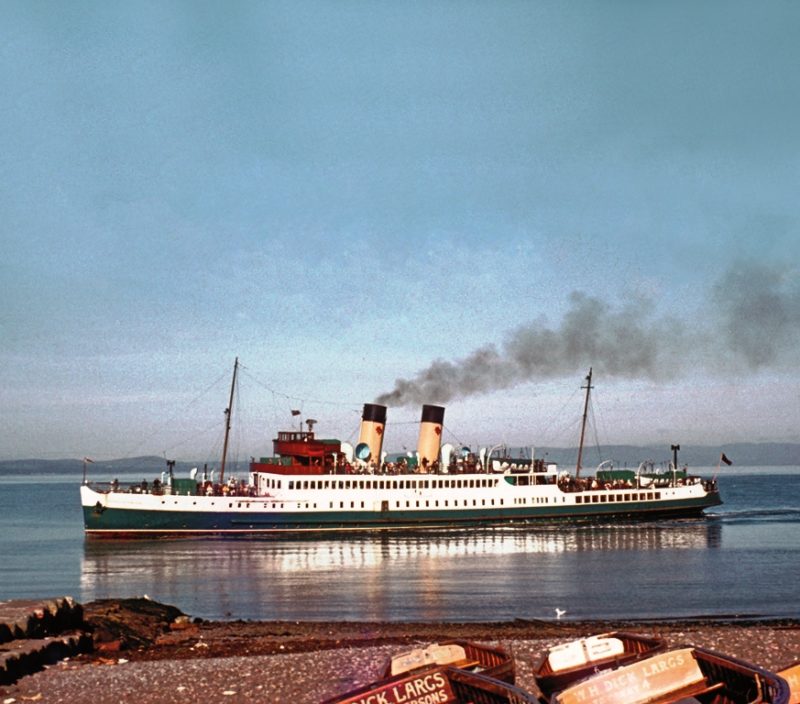
170 YEARS of SERVICE to the WESTERN ISLES, Part 2: The Caledonian Steam Packet Company
(1889-1973) and CALMAC (1973-2021)
Part 1 gave the story of the Macbrayne ‘half’ of Calmac, and Part 2 gives the story of the other ‘half’ of Calmac, of the Caledonian Steam Packet Company. The Caledonian Railway Company opened its Glasgow to Carlisle line on 15th February 1848 to link its system to London. The services of the Glasgow, Paisley & Greenock Railway had been absorbed in 1851, and those of the Wemyss Bay Railway Company in 1865.
Rival railway companies e.g. the North British Railway and the Glasgow & South Western Railway Company thwarted the further development of the company network, including the building of a new pier at Gourock. Gourock harbour was then purchased for £5,500 in 1869 and the new Gourock pier was ready for use in May 1889. The Caledonian Railway Company decided then to go into shipowning as there were no offers from outside the company to operate steamer services from Gourock. The directors of the company were Hugh Brown, James Bunten and John Cowan, and they obtained authorisation from Parliament to purchase four steamers. Two steamers, Meg Merrilees and Madge Wildfire were obtained from Peter & Alexander Campbell plus their routes from Glasgow to Kilmun and Dunoon, and two new vessels were ordered, Caledonia of 244 grt and Galatea of 331 grt, and were delivered in 1889.
The Caledonian Steam Packet Company was formed by its railway company on 8th May 1889 with an authorised capital of £64,000, however only seven shares were ever issued, one each to the seven directors, with Capt. James Williamson as secretary and manager. The yellow funnelled steamers of the Caledonian Steam Packet Co. Ltd. had ten year contracts with its parent railway company to run services on the Clyde and to Ardrishaig, and the fleet rose to six ships to take in new services to Millport on Great Cumbrae, Rothesay, Ardrossan and Wemyss Bay. The Duchess of Hamilton of 553 grt was completed in 1890 and took the first sailing to Brodick on Arran from Ardrossan on 1st June 1890.
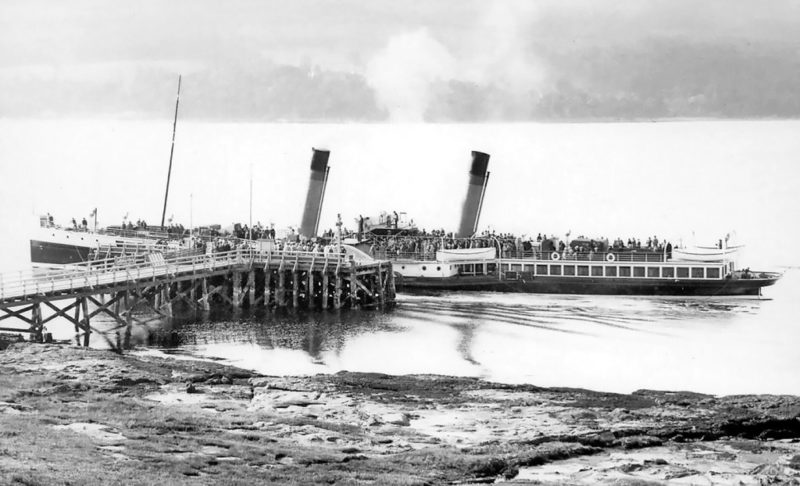
The fleet had eight paddle steamers in 1891 in Meg Merrilees, Madge Wildfire, Caledonia, Galatea, Marchioness of Breadalbane, Marchioness of Bute, Marchioness of Hamilton and Marchioness of Lorne, plus Ivanhoe, which was managed and operated by Capt. James Williamson and had been completed for the Firth of Clyde Steam Packet Company in 1880. Hulls were black, boot topping white, with salmon pink for outside of the saloons and pale blue panellings inside, and paddle boxes were white with gold decoration. Capt. Williamson was a foremost supporter of the decision by the Caledonian Railway Company to have its own fleet, as new vessels were introduced, matched by their railway company competitors, and the start of a ruinous struggle for supremacy on the Clyde. The last decade of the 19th century led to great improvements in the quality of Clyde steamers and the provision of fast, frequent but eventually uneconomic ships.
The rivalry between the Clyde services of the Caledonian Steam Packet Co. Ltd. in 1893 with the fleets of its two railway and other rivals led to the acceptance by all operators of each other’s return steamer tickets. Duchess of Rothesay of 338 grt was completed at Clydebank by J. & G. Thomson as a fast paddle steamer aimed at outpacing rivals to give a fleet of nine paddle steamers plus Ivanhoe, which was acquired in 1897. All three railway companies agreed in 1895 to stagger train departures and arrivals at the Clyde ports to end competition by speed and thus save fuel.
Duchess of Montrose of 321 grt was completed by John Brown & Company at Clydebank in 1902 as a replacement for Meg Merrilees, and was followed by a sister, Duchess of Fife of 336 grt, from the Fairfield yard at Govan in 1903. The turbine powered Duchess of Argyll of 593 grt followed from the Denny yard in 1906 to give the company a peak strength of eleven ships. A pooling agreement was introduced by the three railway company fleets in 1908 with a joint timetable in the following year. However, the Caledonian Steam Packet Co. Ltd. had the better fleet and owned the better berths at Gourock, Wemyss Bay and Ardrossan. The new timetable required equal number of steamers from each of the three rival railway company fleets, Caledonian Steam Packet Co. Ltd., the Glasgow & South Western Railway Company and the North British Railway Company.
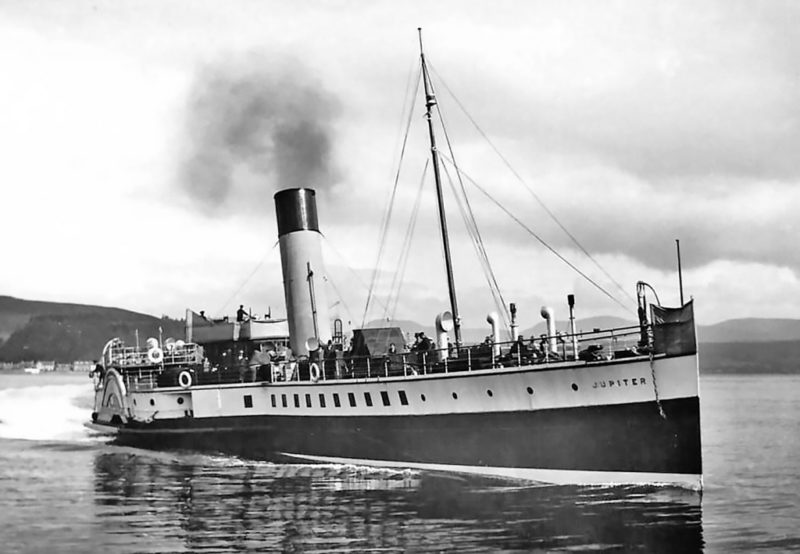
The Duchess of Montrose was modified forward in 1910 and served as a relief ship on the Stranraer to Larne route and then on the Ardrossan to Larne route, which it was found needed two ships instead of the one scheduled. Ivanhoe was sold in 1911, but the pooling arrangement was still leading to many arguments among the three railway company fleets, and was finally cancelled in August 1914 on the declaration of war against Germany. A minimum Clyde passenger service of five steamers was provided during World War I by the three railway company fleets and they would have merged together if their respective Acts of Parliament forbade monopolies. The anti-U boat boom across ‘The Narrows’ between Cloch Point and Dunoon split this fleet of five into two parts, two steamers based at Gourock and three at Wemyss Bay. The steamer Benmore of 235 grt dating from 1876 was chartered between 1916 and 1920 during the period when all of the Caledonian Steam Packet Co. Ltd. fleet were away on war service.
Duchess of Argyll, Duchess of Hamilton and Duchess of Montrose were taken up as troop transports in February 1915 based at Southampton. The latter two were soon converted into minesweepers, but Duchess of Hamilton struck a mine in November and sank. Duchess of Fife and Marchioness of Lorne also travelled south in 1916 to be used as naval minesweepers, followed by Caledonia and the Marchioness of Breadalbane in 1917 in the same capacity. A large sum of £49,000 was received as wartime compensation for service times and ships lost, with Caledonia, Duchess of Argyll and Duchess of Rothesay returned in the first quarter of 1919. Capt. James Williamson died of pneumonia on 14th February 1919 and did not see their return. He was succeeded by Charles Bremner and by the end of the year the fleet was only five steamers, half the fleet that had set out for war.
The fleet had risen to six returned war service steamers in 1920 in Caledonia of 1889, Duchess of Argyll of 1906, Duchess of Fife of 1903, Duchess of Rothesay of 1895, Marchioness of Breadalbane of 1890 and Marchioness of Lorne of 1891. The latter ship was deemed unsuitable for reconditioning and was broken up at Dumbarton in 1923. Henry E. Gordon was Chairman of the company, with six directors in the Marquis of Breadalbane, W. J. H. Maxwell of Dalbeatie, William Younger of Melrose, William Chrystal of Glasgow, J. H. Holdsworth of Lanark and John Stewart of Dunblane. Charles Bremner was Secretary and Manager.
After years of fierce rivalry between all of the railway fleets, the bitter and acrimonious rivals of the Caledonian Railway Company and the Glasgow & South Western Railway Company amalgamated with several other railways at the start of 1923 to form the London, Midland & Scottish Railway (LMS). The steamer fleets amalgamated into the Caledonian Steam Packet Co. Ltd., their funnels being painted yellow with a black top, but between 1923 and 1925 were yellow with a black top and a red band, the latter being removed in 1925. At the same time, the North British Railway and its shipping fleet also amalgamated with other railways to create the London & North Eastern Railway (LNER), for which the famous paddle steamer Waverley of 693 grt was completed by the Inglis yard at Pointhouse on the Clyde in 1947. Funnel colours The Caledonian Steam Packet Co. Ltd. also gained ownership of the small steamer Queen of the Lake of 68 grt operating on Loch Tay in Central Scotland from a base at the eastern end of the loch at Kenmore.
New steamers joined the Caledonian Steam Packet Co. Ltd. fleet in the turbine powered twin funnelled Duchess of Montrose (2) of 806 grt in 1930 from the Denny yard, and her sister Duchess of Hamilton (2) of 801 grt in 1932 from the Govan yard of Harland & Wolff Ltd. Duchess of Montrose broke down on her first voyage on 1st July 1930 and limped back to Gourock, she had obtained 20.7 knots on trials and had cost £76,800. She was back in service after six days, and had been built as a summer excursion ferry and not initially for the regular ferry routes, and her service was mainly from Wemyss Bay to Rothesay or from Greenock to Kyles of Bute. The maximum passenger capacity of these two sisters was 1,300, with Duchess of Hamilton based at Gourock for Lower Clyde work, and running out of Ayr on summer excursions.
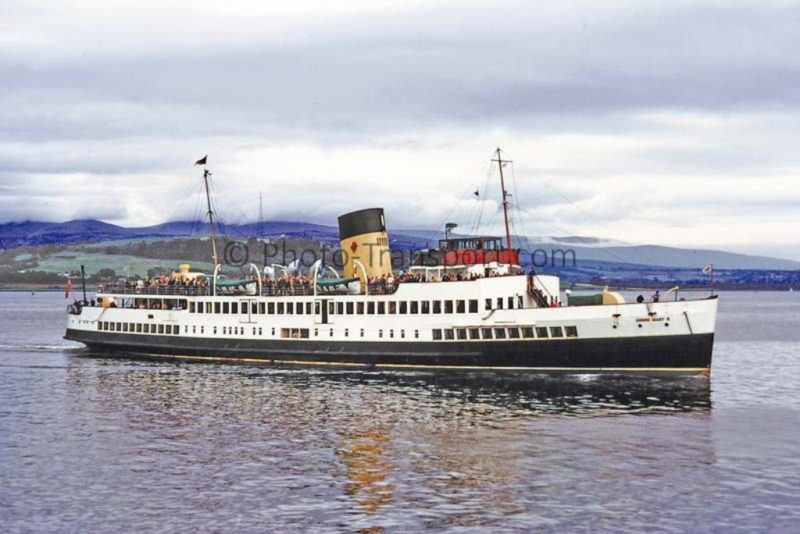
The sisters Mercury (2) and Caledonia (2) of 624 grt were completed by the Fairfield and Denny yards respectively in 1934. They were paddle wheel powered from a three cylinder three crank triple expansion steam engine to give a service speed of 17 knots, but were unusual in design in that they had no paddle boxes as the sponsons were enclosed within the hull to give a 58.0 feet moulded beam. On 8th May 1934, the pair of sisters carried out a press and publicity cruise to Ardlamont. Mercury continued to be slightly trimmed down by the bow, which made her difficult to steer at slow speed, and thus a hydrofoil like skeg was added to the stern to force it deeper into the water. Mercury was used on the Greenock to Gourock, Rothesay and Kyles of Bute service and ran summer afternoon cruises out of Rothesay in 1936, while Caledonia was used for Clyde summer services and the winter Ardrossan to Brodick on Arran service. The winter overhaul of Caledonia in 1935 reduced her paddle floats to six, which gave her a slower speed but she steered much better.
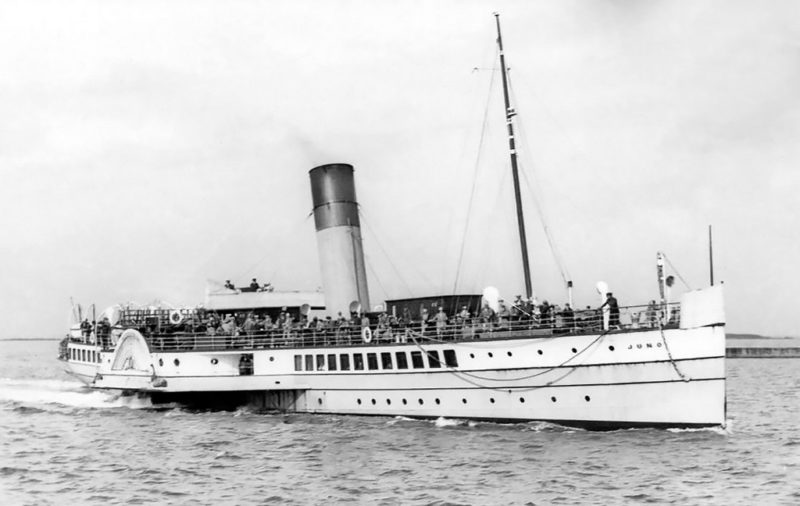
The paddle steamer Eagle III of 432 grt completed in 1910 by Napier & Miller at their Old Kilpatrick yard on the Clyde was taken over from Williamson-Buchanan Steamers Ltd. in 1935. A total of five steamers were taken over by the Caledonian Steam Packet Co. Ltd. from Williamson-Buchanan, briefly in 1935 and permanently from 1943, the others being:-
King Edward of 562 grt, twin funnelled built by Denny and turbine propelled
Queen-Empress of 411 grt completed in 1912 by Murdoch & Murray as a paddle steamer
Queen Mary of 871 grt completed by Denny in 1933 as turbine propelled taking 1,524 passengers on Clyde summer excursions. She was renamed Queen Mary II in July 1934 after months of secret negotiations with Cunard Line, so that work could restart on the giant Cunarder of the same name. She is a very famous ship and joined the Caledonian Macbrayne Ltd. (Calmac) fleet in 1976 as Queen Mary until her final sailing on 27th September 1978 on the Clyde.
Kylemore of 319 grt completed in 1897 by the Russell yard at Port Glasgow but was immediately sold for Brighton to Dover summer excursions and then was repurchased for Great Cumbrae service in the Williamson-Buchanan fleet.
This quintet kept their white funnels, with the paddle steamers receiving two narrow yellow bands near the top of their black hulls, with ventilators painted aluminium colour with blue interiors. New ships also entered the Caledonian Steam Packet Co. Ltd. at this time, including Marchioness of Lorne of 449 grt in 1935 for the Gourock to Millport on Great Cumbrae service, Marchioness of Graham of 585 grt from the Fairfield yard at Govan in 1936 at a cost of £52,000, Countess of Breadalbane of 106 grt for service on Loch Awe in 1936, the engines aft cargo only Arran Mail of 137 grt in 1936 as their only cargo ship, and Wee Cumbrae of 36 grt for service to Great Cumbrae from Largs in 1936, and two improved versions in 1938 as Ashton and Leven, which also ran Clyde river trips to the Empire Exhibition in Glasgow in 1938. The twin funnelled sisters Jupiter and Juno of 642 grt were completed in 1937 for the service from Gourock to Wemyss Bay, Rothesay, Dunoon, and Kyles of Bute at a cost of £128,000 for the pair of sisters. The elderly pair of paddle steamers, Glen Rosa of 306 grt dating from 1893, and the twin funnelled Glen Sannox of 610 grt and dating from 1892, came into Caledonian Steam Packet Co. Ltd. ownership in 1938 via the LMS.
WORLD WAR II SERVICE
Mercury struck a mine and sank in the Irish Sea whilst serving as a minesweeper on 24th December 1940. Juno was bombed and sunk during a blitz on the Thames estuary while serving as the minesweeper H.M.S. Helvellyn on 19th March 1941. Jupiter, her sister, was requisitioned and converted for minesweeping duties and commissioned as H. M. S. Scawfell as part of the 11th Minesweeping Flotilla based first at Milford Haven and later at Dover. She operated as an escort vessel later in the war, and made voyages to the Netherlands after that country was liberated and also between the Tyne and the Humber. On D-Day, she had taken part in Operation Overlord as an anti-aircraft defence ship, bringing down three enemy planes. She ended the war as part of the Thames Defence Flotilla, and returned to the Clyde safely to be refitted by the Meadowside yard of D. & W. Henderson & Co. Ltd. She resumed service on the Holy Loch route in February 1946 and also on the Gourock to Wemyss Bay and Rothesay run.
King Edward of 1901 was used with Queen Mary II of 1933 as troop transport tenders on the Clyde from a base at Greenock. Eagle III was requisitioned for naval service in 1939 but not returned in 1945 and was broken up in 1946. The smaller Ashton and Leven were used as fleet tenders at Gourock during the war, while Arran Mail was used as a cargo tender to merchant ships at Gourock. The twin screw motor vessel Countess of Breadalbane gave up her Loch Awe service during the war, and was laid up on a slip at Kenmore. She resumed her Loch Awe service in the summers between 1948 and 1951, and was then taken overland on a specially constructed Denny trailer towed by two tractors via Dalmally to Inveraray, for launching into Loch Fyne. She then joined the Clyde fleet of the Caledonian Steam Packet Co. Ltd. on feeder services e.g. Largs to Rothesay, Rothesay to Tighnabruaich, Largs to Millport on Great Cumbrae, and also a late afternoon run from Craigendoran to Rothesay. She was a versatile vessel and her final duty was as a cruise ship on Loch Lomond for two hundred passengers as Countess Fiona until laid up in 1989 and broken up in 1999.
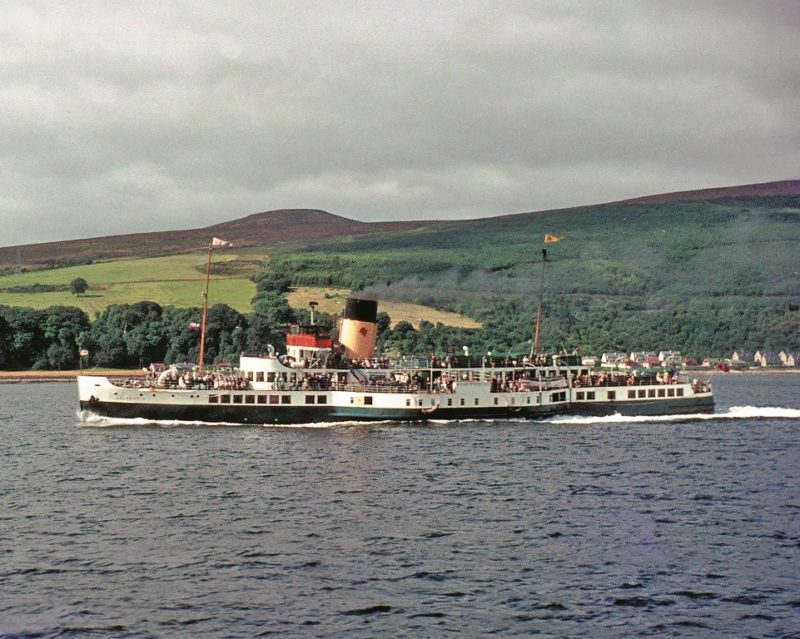
POST-WORLD WAR II SERVICES
No new steamers were built for the fleet of the Caledonian Steam Packet Co. Ltd. in post-war years, however a radical new fleet of motor vessels was commissioned. The railway fleets were nationalised on 1st January 1948 and incorporated the steamer fleet of the London and North Eastern Railway (LNER) when transferred on 5th November 1951 from the British Transport Commission. This took the form of three iconic paddle steamers in the twin funnelled Jeanie Deans of 635 grt built in 1931 by the Fairfield yard, Talisman of 544 grt built in 1935 by the Inglis yard, and Waverley of 693 grt built in 1947 by the Inglis yard. Jeanie Deans had been the flagship of the 11th Minesweeping Flotilla during the war and her gunfire destroyed a V1 flying bomb in the Thames estuary in 1945. She was refitted for commercial work by the Inglis yard and converted to oil firing by the Meadowside yard of D. & W. Henderson in 1956 and fitted with radar in 1960. She operated from Craigendoran near Helensburgh until laid up in 1965 in Albert Harbour, and was sold for a final two years of Thames cruises until broken up at Antwerp in December 1967.
Talisman served in wartime as an anti-aircraft ship and took part in the Dieppe raid on 12th August 1942. She provided the close anti-aircraft protection to the movement of the multitude of sections of the Mulberry Harbour after D-Day and was headquarters flagship to the Mulberry B harbour, during which she was damaged by enemy gunfire and suffered collision damage from a ‘Liberty’ ship and returned to Portsmouth for repairs. She was the first ship to enter Antwerp harbour after liberation on 27th November 1944. She was refitted in 1946 and returned to her Craigendoran service in July 1946, and was converted to diesel power with four diesel engines in 1954 by D. & W. Henderson in the Queens Dock but still retained her diesel electric drive. She then operated on the Wemyss Bay to Millport and Rothesay run until one engine became inoperative, and she operated the summer sailings of 1966 on only three engines. She made her final sailing on 17th November 1966 and was broken up at Dalmuir in October 1967.
Waverley with her LNER red, white and black funnel colours is the most iconic ship of all the Clyde paddle steamer fleet, and a great deal has been written about her. She was a smaller version of Jeanie Deans, and in comparison to the luxury internal decoration of the earlier ship those of Waverley were described as ‘austere’. She had an overall length of 240.0 feet and a beam of 58.0 feet and her diagonal triple expansion steam engine by Rankin & Blackmore Ltd. of Greenock had cylinder diameters of 24, 39 and 62 inches with a stroke of 66 inches. She had a passenger certificate for 1,350 passengers, and was converted to oil fuel burning in Spring 1956 by her builders and her paddle boxes were painted white in 1959. She sailed mostly from Craigendoran during her long Clyde career until laid up in the James Watt Dock at Greenock on 1st October 1973. The story of her equally long career and all of its vicissitudes under the Paddle Steamer Preservation Society is well known, her latest brush with destiny as the most famous paddle steamer in the world came on 3rd September 2020 when she collided with the pier at Brodick, injuring some of her passengers, and needing an emergency sailing from Brodick by the ferry Caledonian Isles of Calmac to take the stranded excursion passengers back to Glasgow.
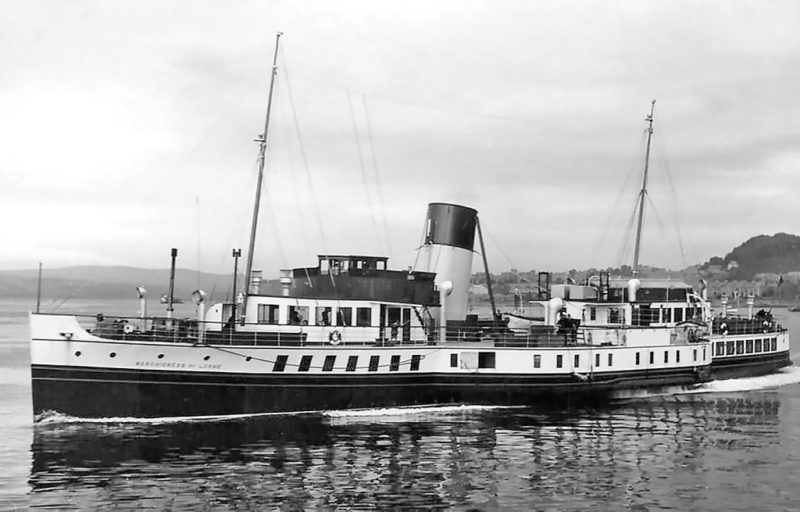
Changing travel and holiday patterns of the Glasgow public led to a fall in demand for traditional ‘doon the watter’ excursions in the 1950s. A radical programme of new diesel engine vessels reshaped the fleet, with even the Loch Lomond excursion paddle vessel Maid of the Loch built in 1953 coming under the control of the Caledonian Steam Packet Co. Ltd. The withdrawal of the paddle steamer Caledonia in 1969, Duchess of Hamilton in 1970, Waverley in 1973, and Queen Mary in 1977 signalled the end of traditional Clyde steamers in favour of highly efficient car ferry links around the Lower Clyde.
The rise of Continental holidays by air finished off the passenger trades, with only those left travelling on essential business, although the virus pandemic of 2020 brought air holiday travel to a grinding halt. Waverley in the hands of dedicated enthusiasts was the only vessel able to buck this trend and show there is a role for Clyde cruising, decades after the Caledonian Steam Packet Co. Ltd. washed their hands of the trade, describing the situation as ‘hopeless’.
The design of four new diesel engine Clyde ferries was released in 1952 by the company, with a shallow draft, shortened Promenade Decks and lifeboats placed low at the stern. They were given the names of ‘Maids’ and this accurately reflected their status in comparison of the ‘Kings’, ‘Queens’, and ‘Duchesses’ of the fleet. Maid of Ashton of 508 grt appeared first in 1953 followed by her sisters Maid of Argyll, Maid of Cumbrae and Maid of Skelmorlie from three different Clyde yards. The class were used on the Gourock to Holy Loch service, sailings from Craigendoran, Gourock to Tarbert service, and as cruise ships to Millport on Great Cumbrae.
All of the quartet were integrated into existing ferry routes and summer patterns of operation, and were financially successful ships but were not all that popular due to their inability to deal with crowds when fully loaded, with the cafeteria hopelessly unable to cope. They gave twenty years of service, even after Maid of Cumbrae was rebuilt as a small car ferry with side and stern ramps in 1972 for the Gourock to Dunoon route. She continued in service as a stern loading car ferry, with restricted space on her aft deck, until laid up at the end of the 1976 season. Three of the class then had further careers in the Mediterranean.
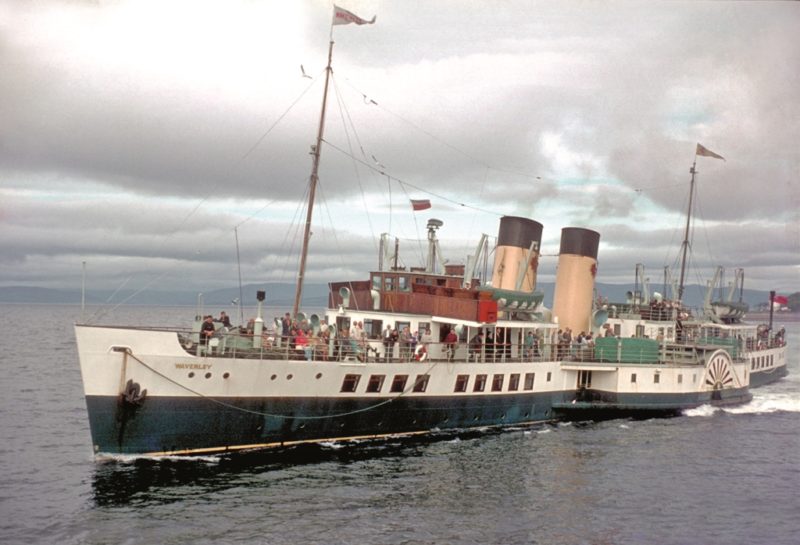
A class of three similar car ferry ‘general purpose’ motor vessels of 563 grt was built by the Denny yard at Dumbarton and the Ailsa yard at Troon during 1953 with accommodation for a large number of passengers, 26 cars or 47 cattle. They were designed by Denny to have a central ramp, with two hand operated turntables, with a lift to lift cars to the tidal quayside level. The wide beam of 35.1 feet even allowed a few small commercial vehicles to be carried in a mixture of cars and small commercial vehicles. The palletised cargo of 50 tonnes was handled by this lift from 1959, and the goalpost mast and derricks were replaced by a tripod mast, with Arran rebuilt as a stern loading car ferry in 1972 by the Barclay, Curle yard with open car space aft at a cost of £100,000. She made her debut as a car ferry on the West Tarbert to Port Ellen on Islay run in Easter 1972. The trio, known as the ‘ABC’ class of Arran, Bute and Cowal, were withdrawn from service in 1979, with Arran becoming a floating restaurant at Dublin, later moving to Salford Quay in Manchester for similar use, and she was broken up in Manchester in 1993. Bute and Cowal had later Greek careers and were broken up in 1984.
Glen Sannox (2) was a car ferry completed by the Ailsa yard in June 1957 at a cost of £468,000 with headroom for the first time for coaches and lorries on the four times daily Gourock to Ardrossan and Brodick summer run, and Fairlie, just south of Largs, to Brodick in winter. She was the first British ship to carry 42 liferafts in place of an extra pair of lifeboats in a trial before legislation was introduced to permit the change. She was also the first to have the red lion emblem on her yellow funnel in 1964, which also improved the appearance of the last Clyde paddle steamers of Caledonia (2), Talisman, Queen Mary II, Jeanie Deans, Duchess of Hamilton and Waverley.
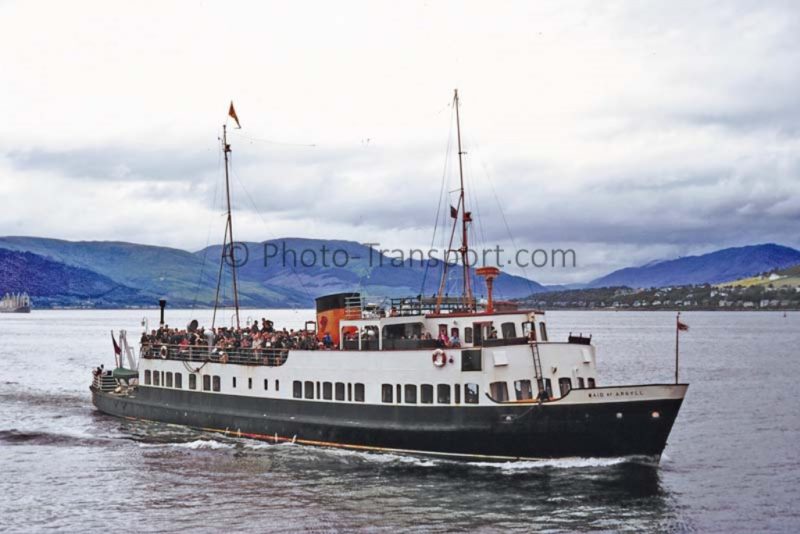
The fleet of the Caledonian Steam Packet Co. Ltd. comprised two dozen vessels in 1960 as follows:-
Arran 568 grt built in 1954 as a side-loading car and general purpose ferry
Ashton 38 grt a motor launch built in 1938
Broadford 57 grt built in 1954 for Kyle of Lochalsh to Kyleakin (Skye) service
Bute 569 grt built in 1954 as a side-loading car and general purpose ferry
Caledonia 623 grt paddle steamer built in 1934
Countess of Breadalbane 106 grt built in 1936 for Loch Tay service
Cowal 569 grt built in 1954 as a side-loading car and general purpose ferry
Duchess of Hamilton 801 grt built in 1932 as a twin funnelled steamer
Duchess of Montrose 794 grt built n 1930 as a twin funnelled steamer
Glen Sannox (2) 1,107 grt built in 1957 as a car ferry
Jeanie Deans 839 grt built in 1931 as a twin funnelled paddle steamer
Jupiter 642 grt built in 1937 as a twin funnelled paddle steamer
Leven 38 grt built in 1938 as a motor launch
Lochalsh 64 grt built in 1957 for Kyle of Lochalsh to Kyleakin (Skye)
Maid of Argyll 508 grt built in 1953
Maid of Ashton 508 grt built in 1953
Maid of Cumbrae 508 grt built in 1953
Maid of Skelmorlie 508 grt built in 1953
Maid of the Loch 555 grt built in 1953, paddle steamer for Loch Lomond service
Marchioness of Graham 585 grt built in 1936
Portree 54 grt built in 1951 for Kyle of Lochalsh to Kyleakin (Skye)
Queen Mary II 1,014 grt built in 1933 as a twin funnelled steamer
Talisman 44 grt built in 1935 as a diesel electric paddle steamer
Waverley 693 grt built in 1947 and now the last of the Clyde paddle steamers, operated by the Paddle Steamer Preservation Society
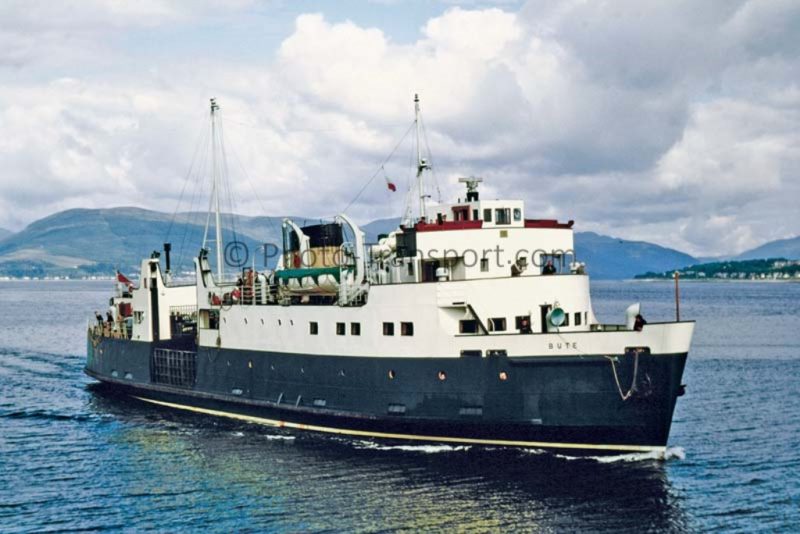
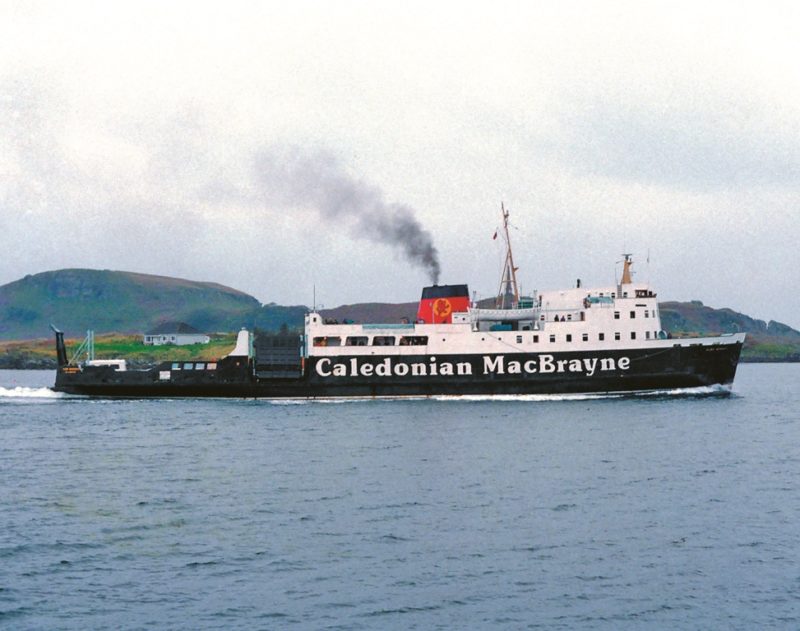
THE FINAL CALEDONIAN STEAM PACKET CO. Ltd. YEARS 1960-1973
On 31st December 1959, the Clyde & Campbeltown Shipping Co. Ltd., part of the LMS railway group, was renamed as the Caledonian Steam Packet Co. Ltd. (Irish Sea Services) for the purpose of carrying on the Stranraer to Larne ferry service. The existing ferry, Princess Margaret, was chartered by this company from British Railways Scottish Region until a new ferry was delivered in September 1973 as Caledonian Princess of 3,630 grt. She had dimensions of overall length of 353.0 feet, moulded beam of 55.0 feet, and moulded depth of 17.5 feet and was designed and completed by the Denny yard at Dumbarton as one of their last ever ships. She was twin screw and powered by twin double reduction geared Pametrada steam turbines of 11,500 shp to give a service speed of 20.5 knots, with astern power being 85% of this figure. She carried 400 First Class passengers with berths for 82, and 1,000 Second Class passengers with berths for 94, and her car deck could accommodate 104 cars, or 50 cars forward and 29 coaches or lorries aft. The big drawback in her later years was that she was only a stern loader.
She introduced a twice daily service on the Stranraer to Larne on her maiden sailing of 16th December 1963, and the traffic soon grew to exceed expectations and a chartered ferry was brought into service to carry only cars, with passengers sailing on Caledonian Princess. She carried a red Scottish lion rampant on her funnel, the first in the fleet to do so, and she was joined by the Baltic ferry Stena Nordica on charter in 1966 carrying both passengers and cars. On 28th May 1968, Caledonian Princess was transferred to the Holyhead to Dun Laoghaire route alongside Holyhead Ferry 1. She then began a thirteen year period of work on the English Channel, Channel Islands, and Irish Sea services. She made a final sailing on 26th September 1981 on the Dover to Boulogne run and was laid up at Newhaven for 18 months. The Michael Quadrini Group of Newcastle then purchased her in December 1982 to serve as a casino, dancing and leisure centre moored at Hillgate Quay in Gateshead beneath the iconic Tyne Bridge completed in 1928. She used the names of both Caledonian Princess and Tuxedo Princess for the next 26 years at Gateshead until she was towed away on 27th July 2008 in fog with an overnight stay at Northumbria Quay at North Shields before setting out for Greece for possible conversion to a casino ship. However, by the end of the following month she was in the hands of shipbreakers at Aliaga in Turkey.
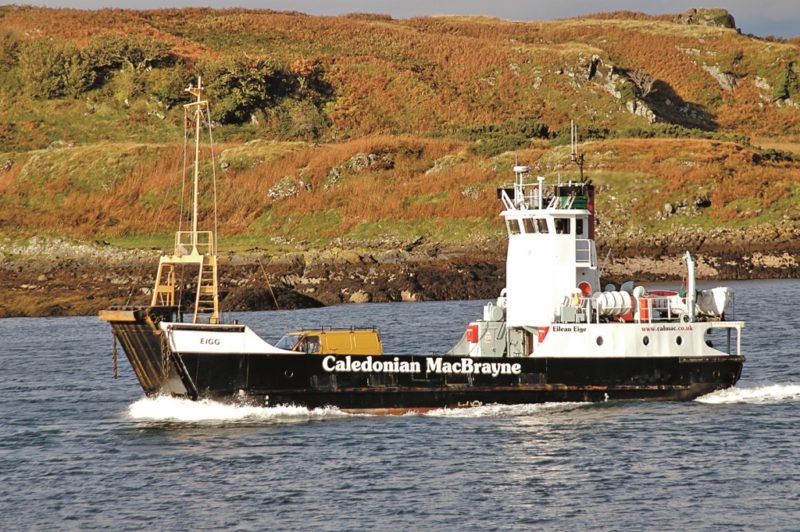
Stena Nordica continued the Stranraer to Larne service on charter for five years from 1966 to 1971, when replaced in March 1971 by Caledonia (3) of 1,156 grt completed in 1966 as Stena Baltica at Langesund. She was acquired in 1970 for £600,000 by the Scottish Transport Group (STG) for the Caledonian Steam Packet Co. Ltd., and also later sailed on the route to Brodick for drive through traffic. The Tyne shipyard of Hawthorn, Leslie (Shipbuilders) Ltd. at Hebburn completed the new ferry Antrim Princess of 3,270 grt and she arrived at Stranraer on 10th December 1967 to take her maiden sailing to Larne a week later with Caledonian Princess sailing from Larne at the same time. She continued on the Stranraer to Larne route until she had a serious incident on 9th December 1983 when disabled by an engine room fire off Islandmagee. Helicopters rescued 108 passengers and 31 surplus crew, with power restored on one engine a day later and her two anchors had kept her from going ashore. She was towed into Belfast Lough and repaired by the Harland & Wolff Ltd. yard and was back on service on 28th December 1983. She was chartered by the Isle of Man Steam Packet Company in October 1985 and renamed Tynwald for her Douglas to Heysham service in April 1986 and which ended on 18th February 1990, and was then sold to Lauro of Italy for further service. The vehicle traffic on the Stranraer to Larne route developed so quickly that a third Italian built ferry arrived at Stranraer in July 1971, releasing Caledonian Princess for service from English ports. Ailsa Princess was of 3,715 grt and twin screw and powered by twin 16 cylinder Pielstick diesel engines to give a service speed of twenty knots. She carried 1,200 passengers with 66 berthed in cabins and one hundred on reclining seats and the remainder accommodated in the large lounge.
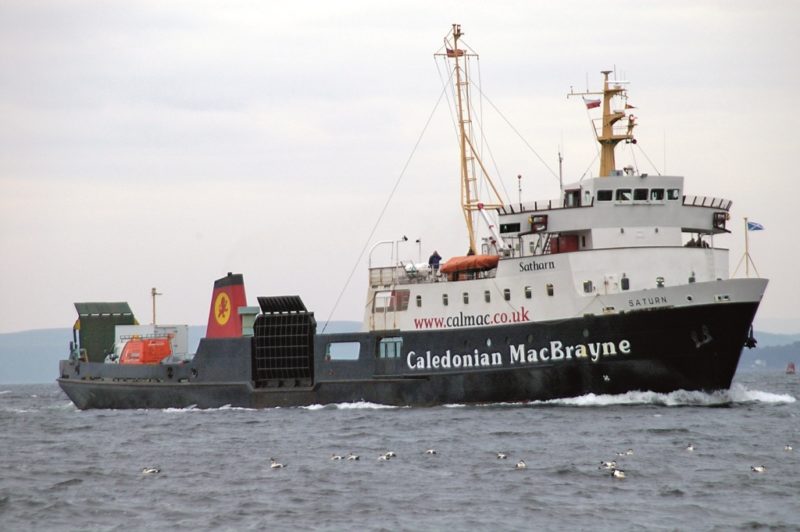
Smaller ferries were completed for or purchased by the Caledonian Steam Packet Co. Ltd. during its final years. The Tilbury ferry Rose of 214 grt was purchased by the company in April 1967 and was renamed Keppel after she arrived in the Clyde by the East Coast route and via the Caledonian Canal. She was modified by James Lamont & Company and fitted with hydraulic gangways with an upper landing platform added behind the navigating bridge. She replaced Talisman on the Millport run on Great Cumbrae, and transferred to Caledonian Macbrayne Ltd. (Calmac) on 1st January 1973 to continue on the run to Millport and had completed one thousand crossing from Largs on 19th June 1986. A larger slip was then brought into service at Largs durng the following day to allow larger ferries with vehicle capacity to reach Great Cumbrae.
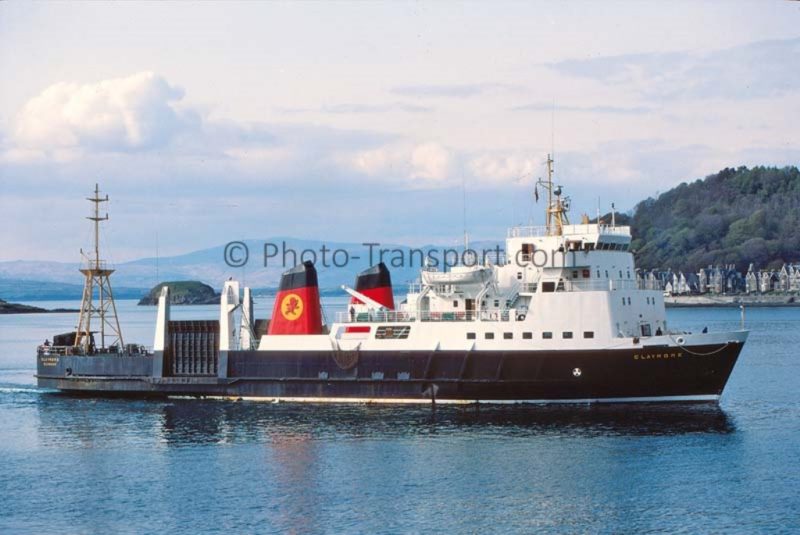
At the end of December 1968, a reorganisation of the Scottish Transport Group (STG) occurred, divorcing it from the railways, and with management of the Caledonian Steam Packet Co. Ltd. passing to the STG. The STG gained control of David Macbrayne Ltd. during the following June and the Macbrayne service from Gourock to Ardrishaig ended on 30th September 1969, leaving the Clyde services entirely to the Caledonian Steam Packet.
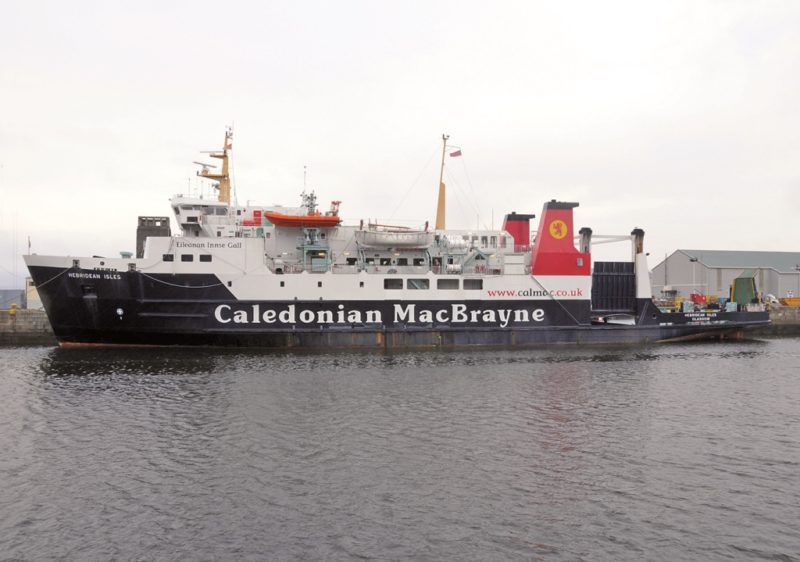
CALEDONIAN MACBRAYNE Ltd. (CALMAC) 1973-2021
Caledonian Macbrayne Ltd. (Calmac) came into being on 1st January 1973 on the merger of David Macbrayne Ltd. and the Caledonian Steam Packet Co. Ltd. The Head Office of Calmac was at The Pier at Gourock, and the management of the big fleet was split between a Divisional Manager for the Western Isles, a Divisional Manager for the Clyde, a Traffic Manager, and a General Manager. The range of services covered seven to the Lower Clyde islands, nineteen services to the Highlands and Islands to Oban, Fort William, Skye ports and the Outer Hebrides, as well as the Kyle of Lochalsh to Kyleakin (Skye) ferry, the Colintraive to Rhubodach (Bute) service, the Lochranza to Claonaig (Kintyre) ferry, and the services to Islay and the smaller islands of Colonsay, Coll, Tiree, Eigg, Muck, Rhum and Canna. A fleet of 28 vessels was taken over to serve 23 Scottish islands, these being:-
Arran 568 grt built in 1953 ‘ABC’ class, side-loading car and general purpose ferry
Broadford 64 grt bow loader passenger and vehicle

Bruernish 64 grt bow loader passenger and vehicle
Bute 568 grt built in 1953 ‘ABC’ class, side-loading car and general purpose ferry
Caledonia 1,156 grt built in 1966 bow and stern loading ro-ro
Claymore 1,024 grt built in 1955 side loader passenger and vehicle
Clansman 1,707 grt built in 1964
Columba 1,420 grt built in 1964
Coll 64 grt built in 1973 bow loader passenger and vehicle
Coruisk 60 grt built in 1969 bow loader passenger and vehicle
Cowal 568 grt built in 1954 ‘ABC’ class, side-loading car and general purpose ferry
Glen Sannox (2) 1,017 grt built in 1957 side and stern passengers and vehicle
Hebrides 1,420 grt built in 1964 side loader passenger and vehicle
Iona 1,138 grt built in 1970 bow, side and stern loading ro-ro
King George V 985 grt built in 1926, excursions from Oban
Kilbrannan 64 grt built in 1972 bow loader passenger and vehicle
Kyleakin 225 grt built in 1970, bow and stern loader passenger and vehicle
Largs 64 grt built in 1960 bow loader passenger and vehicle
Lochalsh 225 grt built in 1970, bow and stern loader passenger and vehicle
Loch Arkaig 179 grt built in 1942
Loch Carron 683 grt built in 1951
Lochnell 31 grt built in 1941
Loch Toscaig 49 grt built in 1946
Maid of Argyl 508 grt built in 1953
Maid of Cumbrae 508 grt built in 1953
Morvern 64 grt built in 1973 bow loader passenger and vehicle
Queen Mary II 1,014 grt built in 1933, Clyde excursions
Portree 65 grt built in 1960 side loader passenger and vehicle
Rhum 64 grt built in 1973 bow loader passenger and vehicle
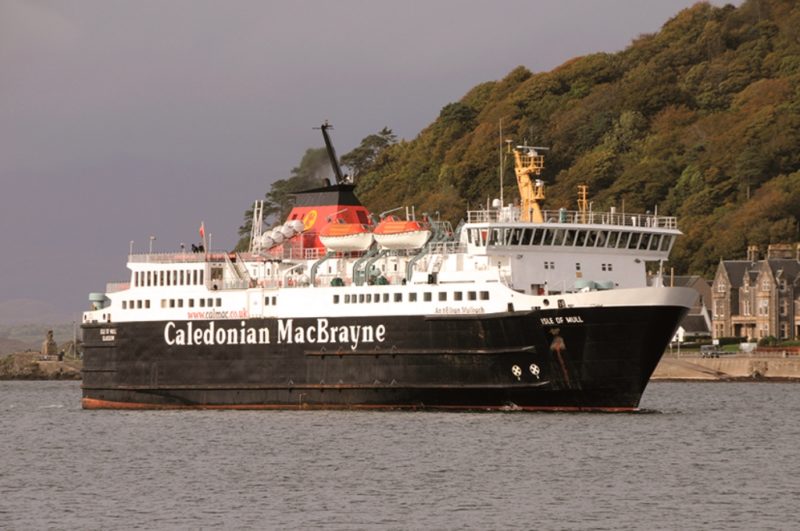
New vessels continued to be built for Calmac in the mid 1970s, including three sisters of Bruernish named Eigg, Canna and Raasay in 1973/76, the Gourock to Dunoon fast ro-ros Juno and Jupiter of 849 grt in 1974 carrying 694 passengers and 36 cars in 1974, Pioneer (3) of 1,071 grt in 1974 as the Islay ferry carrying 300 passengers as well as cars over a stern ramp. Suilven of 1,908 grt in 1974 carried 408 passengers, 120 cars or 14 lorries with a crew of 27 and replaced Clansman on the Stornoway to Ullapool route. The small elderly wooden Iona and Staffa launches Kildonan and Staffa were purchased.
Saturn of 851 grt from the Ailsa yard at Troon entered service in February 1978 on the Wemyss Bay to Rothesay route, and was an improved version of Juno and Jupiter of 1974 carrying 694 passengers in summer and three dozen cars. Great Cumbrae received the new double ended Isle of Cumbrae ferry of 201 grt also in 1978 with a small hidden funnel on the split superstructure opposite the bridge on her ten minute crossing from Largs. The long seven hour crossing from Oban to Castlebay (Barra) and Lochboisdale (South Uist) received the new Claymore of 1,631 grt in January 1979 from the Robb yard in Leith at a cost of £3 million with accommodation for 32 berthed and 468 deck passengers, and with 47 cars carried across her stern ramp and port and starboard side ramps. She suffered two mishaps with rocks, grazing rocks off Kerrera bending her port screw and damaging her hull on 8th December 1980, and she was also aground on Gasay Island on 5th February 1982, puncturing her hull with repairs at Greenock on both occasions. An engine breakdown on 15th August 1983 resulted in the relief Calmac vessel being brought into service until repairs were completed. She was moved to the Kennacraig to Port Askaig and Port Ellen route in 1993 when replaced by the new Isle of Arran, and had also served on the Mallaig to Armadale route. Lochmor of 189 grt entered service in summer 1979 on the service from Oban to the inner islands and also from Mallaig to Eigg, Muck, Rhum and Canna with accommodation for up to 120 passengers.
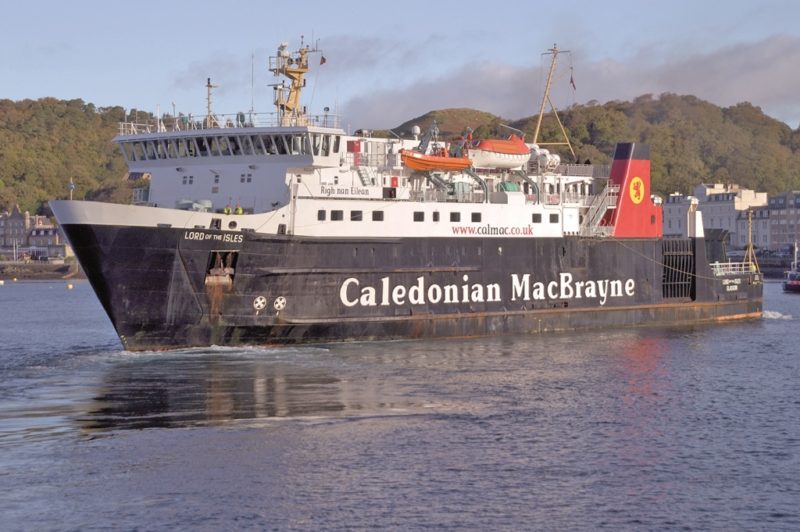
The new Isle of Arran of 3,296 grt entered service on the Ardrossan to Brodick yard on 7th April 1984 from the Ferguson yard at Port Glasgow. She has accommodation for 800 deck passengers and her car deck has capacity for 80 cars, with a service speed of 15 knots from twin eight cylinder Mirlees diesel engines and twin screws. She was the first Calmac to have ‘Caledonian Macbrayne’ in large white letters on both sides of her hull, and a white strake line was added to her hull on her first overhaul. She replaced Clansman on her route, and had later problems with her bow visor becoming jammed from buffeting by high seas. In 1988, Calmac had a fleet of thirty ferries in service around the Clyde and Western Scotland, of which all but two carried cars and commercial vehicles on a ro-ro basis, as well as passengers. Four doubled ended new ferries of 206 grt had been completed between 1981 and 1987 as Loch Linnhe, Loch Ranza, Loch Riddon and Loch Striven.
In 1990, Calmac ceased to be owned by the Scottish Transport Group (STG), and was owned by and reported directly to the Secretary of State for Scotland. A new car and passenger ferry service was opened in 1997 between Ballycastle on the mainland of Northern Ireland and Rathlin Island, but was transferred to Rathlin Ferries Ltd. in 2006 along with the ferry Canna. Calmac carried five million passengers and one million cars and a large number of cattle per year at this point in time in 1997, with service reliability on time being 96%.
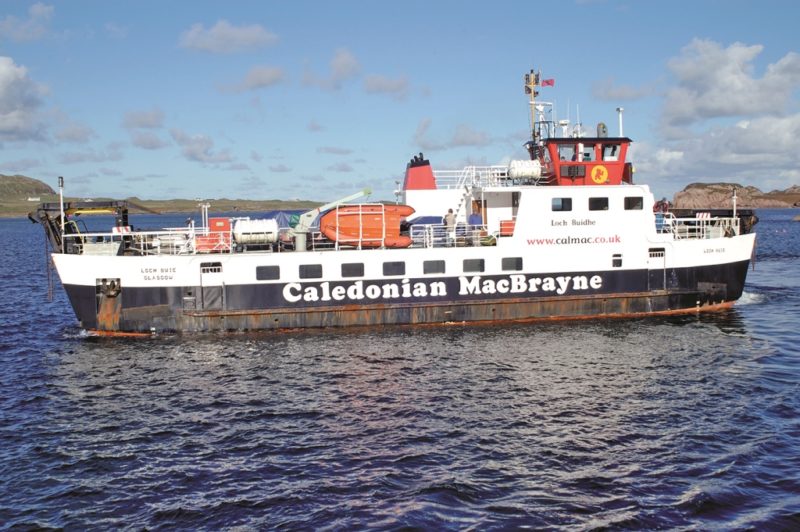
Four new large ferries entered service between 1985 and 1993 in Hebridean Isles of 3,040 grt in 1985 on the Uig triangle route from Uig to Tarbert (Harris) and Lochmaddy (North Uist) with accommodation for 507 passengers and space on her car deck for 68 cars and with a crew of 24. Isle of Mull of 4,719 grt entered service in 1988 on the Oban to Craignure on Mull service with accommodation for one thousand passengers and space on her car deck for 80 cars and with a crew of 28. Lord of the Isles of 3,504 grt entered service in 1989 on the Mallaig to Armadale, Castlebay (Barra) and Lochboisdale (South Uist) run with accommodation for 506 passengers and space on her car deck for 56 cars and with a crew of 28. Caledonian Isles of 5,221 grt entered service on the Ardrossan to Brodick run in August 1993 with accommodation for one thousand passengers and space on her car deck for 110 cars and with a crew of 26.
The larger Calmac ferry Isle of Lewis of 6,753 grt from the Ferguson yard at Port Glasgow entered service in July 1996 when she called in at Oban en-route to her intended run from Ullapool to Stornoway. She cost £16 million and replaced Suilven on the route and has accommodation for 968 passengers and space on her car deck for 123 cars and with a crew of 32. She has a service speed of 18 knots from twin six cylinder Mirlees diesel engines of 8,800 bhp driving twin controllable pitch propellers.
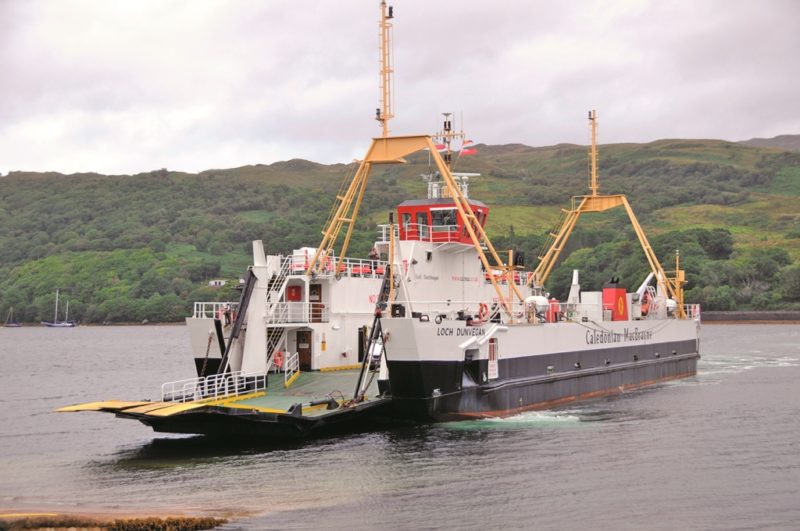
Capt. John Simkins became Managing Director in 1998 and had an exciting first year in command, with the highlight coming with the naming of the new Clansman (5) of 5,499 grt in July 1998 at the Appledore yard in North Devon of Appledore Shipbuilders Ltd. by H.R.H. Princess Royal. She has dimensions of overall length of 101.0 metres, moulded beam of 16.76 metres, and moulded depth of 5.5 metres and a draft of 3.22 metres, with two decks and a car deck of lane length 230 metres to take 100 cars. She carries 634 deck passengers with a crew of 32 at her service speed of 16.5 knots on her seven hour route from Oban to Castlebay on Barra and Lochboisdale on South Uist, where new dolphins were built at both ports so that Clansman could berth safely. At this time, there were also slip upgrades at Largs, Colintraive, Kilchoan and Tobermory on Mull to accommodate larger ships. Clansman (5) has a self service restaurant and a fully licensed bar, as on all of the larger Calmac ferries. The waiting room on Coll was upgraded and a new office opened at Craignure, with the Tarbert (Loch Fyne) to Portavadie (Cowal peninsula) service continuing through the winter of 1998/99 on an experimental basis with a view to becoming permanent. Funds were also made available by the Scottish Government to build two new vessels to replace Lochmor and Pioneer, which had been the fleet relief vessel since the disposal of Claymore of 1978 from her Kennacraig to Islay routes.
Clansman (5) was out of action for six weeks from 17th June 2010 for crankshaft repairs. She has relieved over the years all of the large Calmac ferries during their annual refits, leaving Lord of the Isles on her route, and she has been seen at Uig, Stornoway, Mull and Arran. Since April 2016, Clansman (5) has served Coll, Tiree and Colonsay from Oban, with Isle of Lewis on the Mallaig to Lochboisdale run and thus ending the direct run from Oban to South Uist. She served on the Uig triangle route in October 2016, in place of her near sister Hebrides of 5,506 grt from the Ferguson yard in 2001 during her refit, with Hebrides launched by H. M. The Queen in August 2000 for the Uig triangle run replacing Hebridean Isles, which was transferred to the Islay service. Clansman (5) took three months for an overhaul from February to May 2018 after she severely damaged a propeller and shaft while berthing at the Garvel dry dock in the James Watt Dock at Greenock.
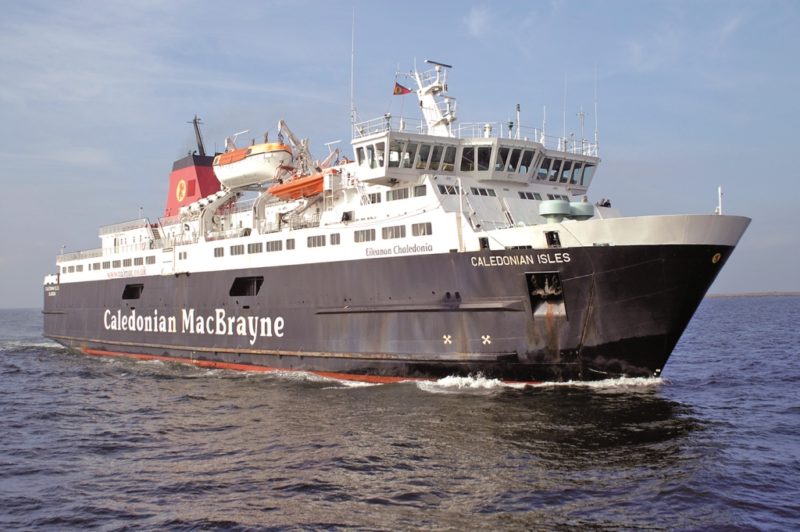
Lochnevis of 941 grt was completed in October 2000 by the Ailsa yard at Troon with accommodation for 200 passengers and space on her car deck for fourteen cars and entered service on the small isles service from Mallaig. The first of two new sisters from the Remontowa yard in Poland entered service as Bute in 2005 followed by her sister Argyle of 2,643 grt in May 2007 for the Bute service. Loch Shira entered service in June 2007 on the Great Cumbrae route from Largs, replacing Loch Alainn, which moved to the Barra local service replacing Loch Bhrusda. Two further new ferries have completed the current fleet of Calmac, in Finlaggan of 5,626 grt launched in Poland in 2011 for the Kennacriag to Port Askaig and Port Ellen run, and named after the historic settlement on Eilean Mor in north east Islay, and the very streamlined largest Calmac ferry Loch Seaforth (2) of 8,680 grt launched in March 2014 at the Flensburger yard in Germany at a cost of £42 million. She entered service on the Ullapool to Stornoway route in February 2015 following upgrades to the piers at both of her ports of call.
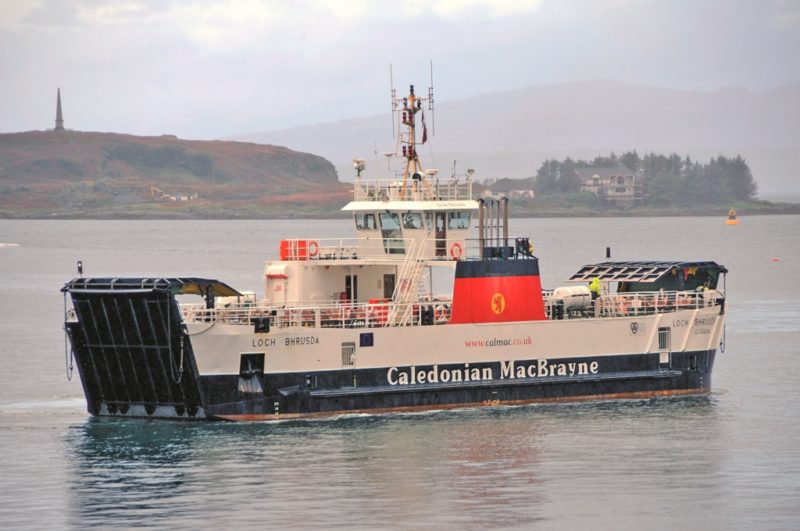
The Skye Road Bridge over Loch Alsh of length 500 metres opened on 16th October 1995 after three years of construction, and replaced the Kyle of Lochalsh ferry service. The Scalpay ferry was replaced by a bridge in 1997, the Vatersay ferry was replaced by a causeway in 1991, and the calls at Portree on Skye ceased in the 1980s, and the calls on Coll and Tiree on the Oban to Tobermory (Mull) service ceased in the 1980s, and the Gourock to Dunoon service of Calmac ceased on 29th June 2011 when Western Ferries took over the vehicle service. The Ali Cat of 78 grt motor catamaran passenger vessel was acquired by Calmac on 13th October 2002 for the busy commuter traffic between Dunoon and Gourock and made her first crossing a week later. She has a maximum capacity for 250 passengers and has a service speed of 14 knots and a crew of four. Ali Cat formed part of a new contract for the passenger only service between Dunoon and Gourock from 2011. In addition, various combinations of routes e.g. between Bute and Arran have ceased by the State owned Calmac ferries where private operators have taken over. Calmac Ferries Ltd. operate the Clyde and Western Highland ferry services, while Caledonian Maritime Assets Ltd. actually own all of the ferries and piers.
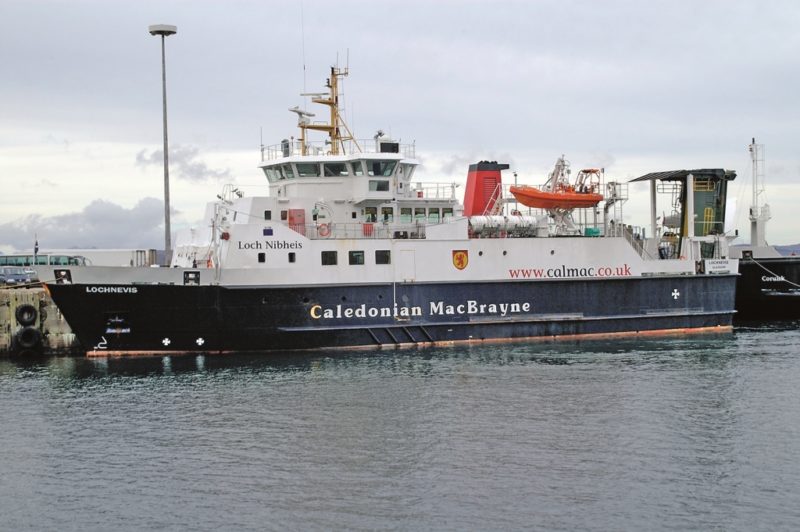
CURRENT CALMAC ROUTES and the SHIPS THAT SERVE THEM
Ullapool-Stornoway Loch Seaforth – 2 hours 30 mins. Also overnight freight service
Uig-Tarbert, Harris Hebrides – 1 hour 40 mins.
Uig-Lochmaddy Hebrides. – 1 hour 45 mins.
Berneray-Leverburgh Loch Portain – 1 hour
Mallaig-Lochboisdale Lord of the Isles – 3 hours 30 mins.
Barra-Eriskay Loch Alainn – 40 mins.
Oban-Castlebay Isle of Lewis, Clansman – 4 hours 45 mins.
Sconser-Raasay Hallaig – 25 mins
Mallaig-Eigg-Muck-Rum-Canna Lochnevis
Mallaig-Armadale Loch Fyne – 30 mins.
Oban-Coll-Tiree Clansman – 3 hours 50 mins.
Kilchoan-Tobermory Loch Tarbert -35 mins.
Lochaline-Fishnish Lochinver – 18 mins
Oban-Craignure Isle of Mull, Coruisk – 50 mins.
Oban-Lismore Loch Striven – 55 mins.
Gallanash-Kerrera Carvoria – 5 mins
Fionnphort-Iona Loch Buie – 20 mins.
Oban-Colonsay Clansman – 2 hours 15 mins.
Kennacraig-Port Ellen Finlaggan, Hebridean Isles – 2 hours
Kennacraig-Port Askaig Finlaggan, Hebridean Isles – 2 hours
Tayinloan-Gigha Loch Ranza – 20 mins.
Tarbert, Loch Fyne-Portavadie Isle of Cumbrae – 25 mins.
Claonaig-Lochranza Catriona – 30 mins.
Gourock-Kilcregga Chieftain – 13 mins.
Gourock-Dunoon Ali Cat, Argyll Flyer – 25 mins.
Colintraive-Rhubodach Loch Dunvegan – 5 mins.
Wemyss Bay-Rothesay Argyle, Bute – 35 mins.
Largs-Cumbrae Loch Shira – 10 mins.
Ardrossan-Brodic Caledonian Isles – 55 mins
Ardrossan-Campbeltown Isle of Arran – 2 hours 40 mins.
These schedules and vessels can change due to seasonal demands.
Loch Bhrusda, Loch Linnhe and Loch Riddon are relief vessels.
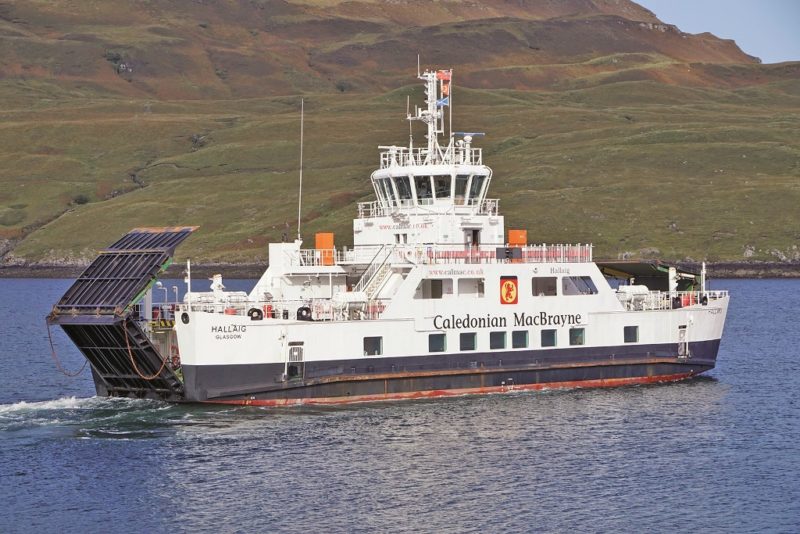
POSTSCRIPT
The current fleet of Calmac has 33 ferries of all descriptions on 30 routes and currently carries over five million passengers in 2020 with an annual turnover of over £200 million. Calmac has 1,500 employees, a very go-ahead Board of Directors, and operates 25 ports and slipways in Scotland. In 2015 Calmac also secured a 35 year concession worth £1 billion to operate Marchwood Military port on Southampton Water. This is being run by Solent Gateway Ltd which is a company set up for this venture and is jointly owned by David MacBrayne Ltd., the parent company of CalMac, and logistics company GBA (Holdings) Ltd.
Calmac took over the management of the Port of Perth in 2018 from Perth and Kinross Council, and have increased harbour fee income by almost fivefold in two years. Cargo now handled at Perth includes timber, aggregates, barite mineral, fishmeal and general cargo in ships of up to 2,500 dwt.
A continuous full programme of improvements to the big fleet of ferries is carried out, those in 2020 included the fitting of more internal seats in lounges, better life saving equipment, disabled bathroom and toilet facilities, upgrades to passenger lifts, upgrades to pitch control and steering systems, and upgrades to the hydraulic control gear that open and close the bow visors of the ferries as well as upgrades to the stabiliser control equipment for smoother passenger comfort in rough weather.

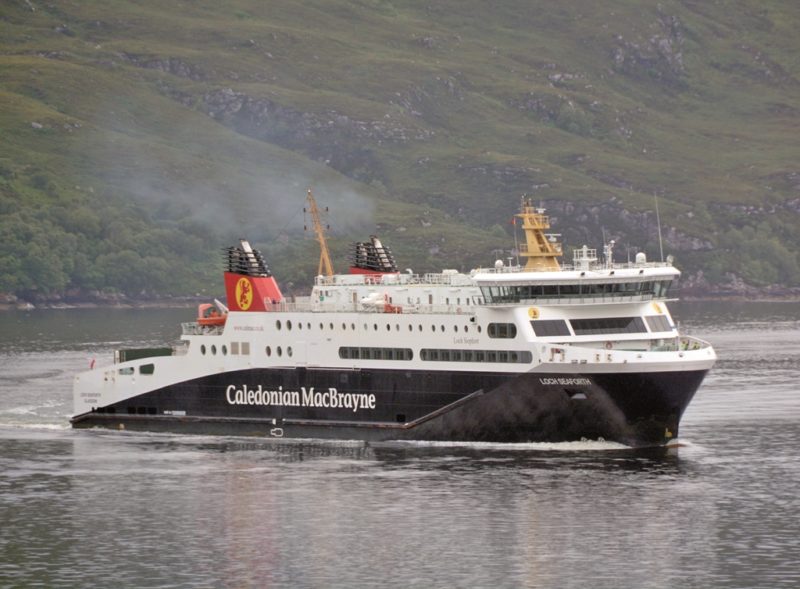




Comments
Sorry, comments are closed for this item